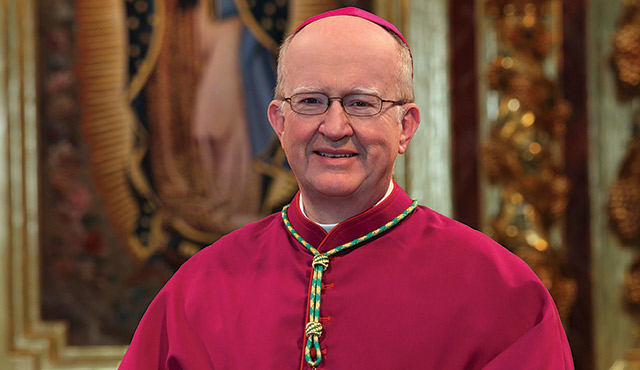The life of the Diocese of Springfield in Illinois, where I was born and served as a priest, in many ways has been intertwined with the life of the Archdiocese of St. Louis. I was thinking, for example, of the motto of the bishop who ordained me to the priesthood in l981, Bishop McNicholas, originally from St. Louis, whose motto was “I come to serve,” and now Archbishop George Lucas, whose motto is “Grace and mercy.” These past days also, as I was reflecting on the “Year of Mercy” and our diocesan plans for that year, I also became aware of Pope Francis’ recent announcement of the ability of priests to absolve from the sin of abortion, and the importance of this and the accessibility of this sacrament in these most difficult and painful moments. His announcement helps all of us to not only reflect on the gift of the sacrament of penance but the sacrament as an encounter with the merciful and forgiving Lord: being sent to serve the Lord’s people and making the grace and mercy of the Lord visible and accessible.
When Bishop McNicholas sent me to Rome to study canon law at the Angelicum, I quickly found that the Dominican professors of canon law were teaching by word and example that the revised Code of Canon Law—in all of its seven books—was for the “good ordering” of the community of faith and the pastoral care of the Lord’s people with grace and mercy. The Dominicans were the best of teachers and examples to all of us in those days, and still are.
I learned that lesson again when I was assigned as a priest in the Diocese of Springfield in Illinois in all of my assignments. What the Holy Father was referring to about absolution in cases of abortion has long been the practice here in most dioceses in the United States, Canada and England. Because of a practice called “delegation of faculties” in the Code of Canon Law, priests here have already had for many years the ability to absolve from abortion—and that includes not only the women involved, but anyone else as well. There have been a number of commentaries on this in recent days, and I especially thank Rocco Palmo who, in “Whispers in the Loggia,” recently offered a clear reflection on this practice that, as I said, has been the pastoral practice here for years.
This is nothing new for us, but has been a practice of grace and mercy for many, many years. In this light, I would also like to mention and acknowledge and thank all of those involved in the pastoral outreach “Project Rachel” or “Rachel’s Vineyard.” The dedicated women and men in this ministry work and witness tirelessly to help bring healing and a new beginning where the tragedy of abortion has had so many sad effects in personal lives, marriages and families. An integral part of this ministry is compassionate, caring use of the sacrament of penance and the rite of reconciliation—a gentle, freeing, loving encounter with the Lord of Mercy.
We are very grateful for the Holy Father’s reminder to all of us in this, and thankful as well for the pastoral and canonical practice in these matters that has been part of the life of the Church here in the United States for many years already: “I come to serve—grace and mercy.”

